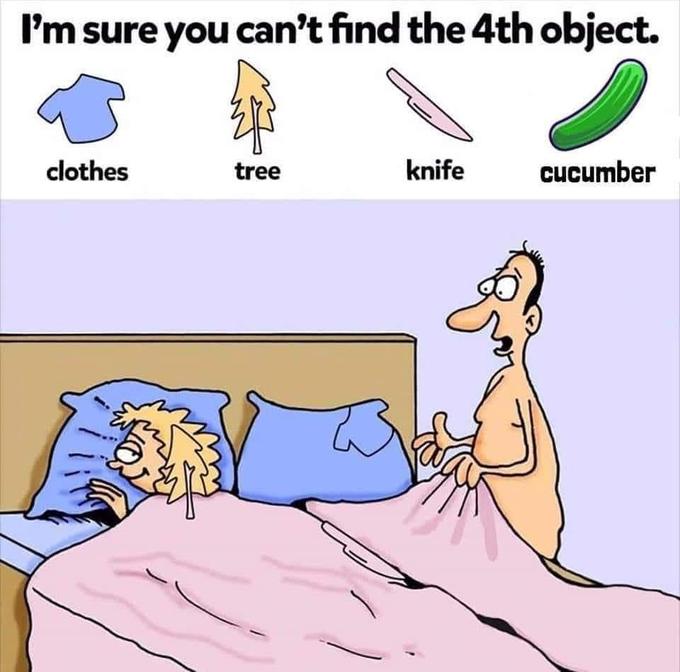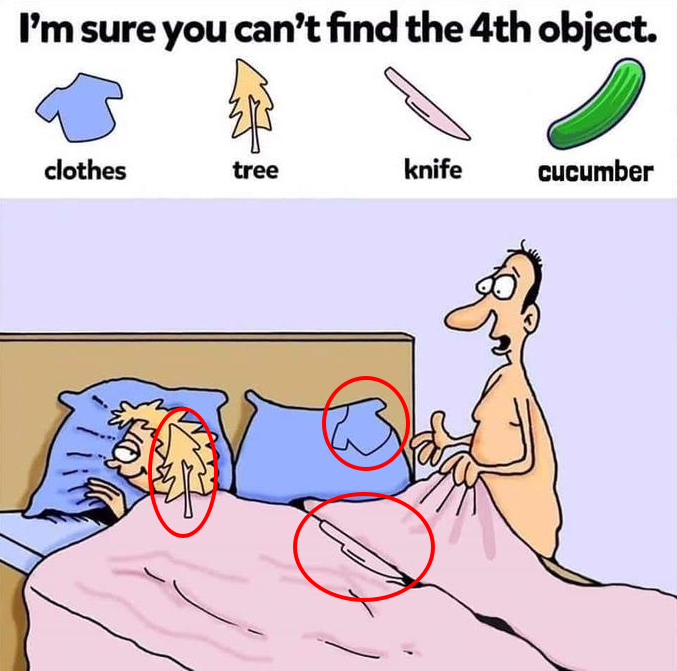When Awkward Relationship Drama Becomes Comedy Gold
Let’s be real—relationship problems are rarely fun. They’re messy, emotional, and sometimes downright heartbreaking. But every now and then, a situation is so bizarre and awkward that instead of crying, all you can do is laugh. That’s exactly the kind of moment captured in a clever cartoon where a man confronts his partner about cheating—only to discover the “other man” is hilariously obvious: a pillow with a face tattooed on it.
This visual gag strikes a perfect balance between cringe-worthy awkwardness and laugh-out-loud absurdity. Beneath the humor lies a reminder of how denial, embarrassment, and raw emotion often collide in relationships—and why laughter can sometimes be the healthiest way to process it all.

The Cheating Conundrum: When the Obvious Slaps You in the Face
Infidelity is no joke in real life, but this cartoon flips the narrative with pure comedy. The man’s shocked expression is a perfect metaphor for that moment of truth when the evidence is so blatant it can’t be ignored. The “cheating” pillow with its goofy face embodies the absurdity of trying to hide something obvious, almost mocking the idea of denial.
Most of us have experienced a situation where the truth was staring us right in the face, yet we didn’t want to accept it. That’s what makes this cartoon hit home—it exaggerates the ridiculousness of denial while making us chuckle at how universal that moment of realization really is.
Why We Laugh at Relationship Drama
Humor has always been a survival tool. When faced with pain, disappointment, or betrayal, laughter becomes a release valve. Instead of drowning in anger or heartbreak, we allow ourselves to breathe and find perspective. This cartoon reminds us that even in love’s messiest moments, there’s room for lightness.
Laughing at awkwardness also connects us. Who hasn’t had a cringey relationship moment that, in hindsight, is more funny than tragic? Whether it’s an embarrassing fight or a ridiculous misunderstanding, these moments remind us that love isn’t always graceful. Psychologists even point out that humor works as a “stress buffer,” helping us process heavy emotions in manageable ways. By turning betrayal into a joke, this cartoon transforms pain into something we can laugh about—and maybe even learn from.
The Power of Visual Comedy
Cartoons have a unique way of amplifying human truths through exaggeration. In this case, the wide-eyed man and the ridiculous pillow face do all the storytelling without words. The visual punchline lands instantly: betrayal made both ridiculous and undeniable.
The beauty of this kind of humor lies in contrast. A pillow—normally a symbol of comfort and intimacy—becomes the unexpected “other man.” This twist works because it catches us off guard, subverting expectations and forcing a laugh. By taking something familiar and flipping it on its head, cartoons can make serious topics more approachable.
Laughing Through the Pain of Cheating
While cheating is no laughing matter, approaching it with a hint of humor can make the emotional blow easier to process. It’s not about minimizing the pain but about softening the edges of heartbreak. Sometimes laughter gives people the courage to confront difficult truths without feeling crushed.
Interestingly, couples who can laugh together about their conflicts often enjoy stronger, healthier relationships. Humor doesn’t erase problems, but it does create space for forgiveness, communication, and healing. In that way, this cartoon is more than just a joke—it’s a reminder that sometimes laughter is the bridge between anger and resolution.
Awkwardness as a Path to Growth
As uncomfortable as they are, awkward moments push us toward self-reflection. The man’s cartoonish shock could be the first step toward acknowledging the truth and deciding what to do next. That’s the hidden gift of awkwardness—it forces clarity.
When we use humor to navigate these moments, we build resilience. We learn not to crumble under the weight of embarrassment but to carry it with grace and even laughter. That’s a powerful form of emotional intelligence.
Relatability in Art and Comedy
The reason this cartoon resonates is simple: it mirrors real life. Anyone who has experienced betrayal—or even suspected it—knows the gut punch of realization. By framing that pain in a silly, over-the-top way, the cartoon gives us permission to laugh at the absurdity of human relationships.
Art like this validates our emotions by showing we’re not alone in facing awkward truths. It says: yes, relationships are messy; yes, betrayal hurts; but yes, you can laugh about it too.
Conclusion: Finding Light in the Dark
The image of a man confronting his partner, only to face a “cheating” pillow, is both ridiculous and strangely profound. It shows that even in the darkest corners of love, humor has the power to heal.
The next time life hands you an awkward heartbreak, consider this cartoon’s lesson: sometimes the healthiest response is a laugh. Humor doesn’t erase the pain, but it can make the chaos more bearable and the healing a little easier.
After all, resilience isn’t always about being tough—it’s about finding the strength to smile through the absurdity and move forward lighter at heart.






